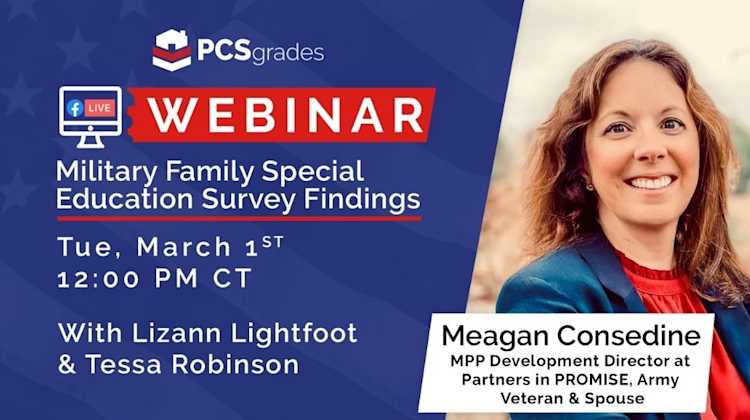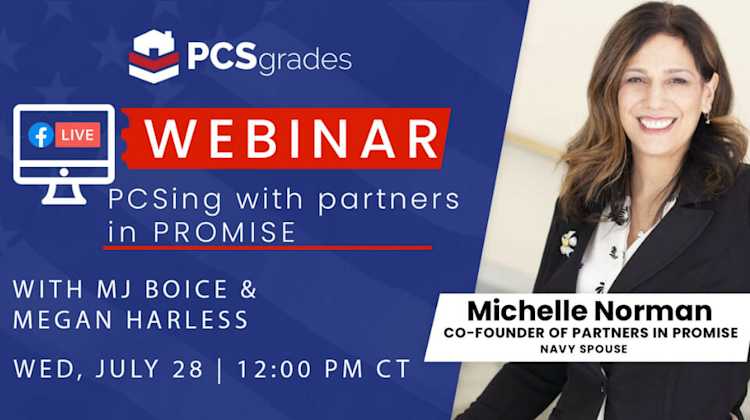What EFMP Families Should Know Before a PCS
by Lizann Lightfoot - September 21st, 2021

Moving as an EFMP family is never easy, but a PCS becomes even more difficult for military kids with EFMP status.
What is an EFMP family?
The Exceptional Family Member Program (EFMP) assists military dependents who are diagnosed with anything from a wide range special needs including physical, emotional, or learning challenges. Many school-aged children who are in the EFMP program are also enrolled in special programs at their local school, which means having an IEP (Individualized Education Plan). When used correctly, the EFMP program and IEP can be effective tools to support military children and families on their education journey.
However, what happens when an EFMP family receives PCS orders? The child will be enrolled in a new school, often in a new state. In theory, their IEP should travel with them, and they should continue to have access to medical specialists through the TRICARE network. But anyone who has been through a move knows that PCSing affects every person in the family on many levels. Since various states have different laws and requirements, transferring an IEP from one state to another is not always a smooth process.
Programs that support EFMP students
One program that helps military families navigate the challenges of moving with an EFMP child is called Partners in Promise. They research regulations and point families toward effective resources. Their annual survey highlights some of the challenges that EFMP families face, especially during a military move. We interviewed Partners in Promise co-founder Jennifer Barnhill to discuss what military families should know about moving with EFMP students.
Partners in Promise conducts an annual survey of EFMP families to assess what programs are working and where families need more assistance. This year, according to Barnhill, “our survey showed that the PCS transition is the key pain point for a military family. It can be a PCS, or the transition into military life or into civilian life. All of those life transitions are difficult medically and educationally for families in the EFMP program. Families were reporting significant gaps in services during these moves.”
Myths about EFMP students
One myth about EFMP is that military families with an EFMP status member won’t need to relocate as often. Barnhill says while this may be true for some very specific conditions that can only be treated by specialists near one military base, it is not generally the case. The problem is that the different military branches have not standardized EFMP.
Barnhill explains, “the Navy has EFMP categories, and some categories mean you are likely to stay near a larger location or not go overseas. But other branches do it differently.” Although the families responding to the survey were more likely to be older, more experienced, and have school-aged children, Barnhill says, “our survey found that 90% of all survey responders had moved before, and 24% had moved 5 or more times.”
The other myth that Partners in Promise tries to dispel is the stigma that EFMP will have a negative impact on the service member’s career. EFMP status is meant to help and defend the military dependent, not to punish a service member.
Barnhill says, “we need to understand that special education is not weakness; it is just giving kids extra tools to succeed in life and in the military. Our organization is here to help parents have those tools and de-mystify some of that experience. We want parents to know they aren’t alone and that their child will be okay.”
What do EFMP families need to know before a PCS move?
That’s why it’s so important that military families who are in the process of an EFMP diagnosis coordinate the timing with their PCS move. Barnhill recommends, “if parents are early in a diagnostic process, we highly recommend you finish that process before you move. Otherwise, you may have to start over again and lose some of that progress. If you already have a diagnosis, reach out to the school district, and tell them you are coming. Have the sending teacher write a letter of introduction for the new teacher to introduce the student, and introduce yourself in a letter to the new teachers to start with a positive experience.”
The Partners in Promise website offers numerous resources to help military families understand the EFMP process better so they know when they qualify and how to apply. They are hosting a “Trust Your Gut” series of interviews on Facebook to honor the Month of the Military Child in April. According to Barnhill, “we are interviewing experts to help military families navigate the world of special education. We want to help families experiencing those transitional moments determine whether behavior is caused BY the transition, or caused by underlying causes. As a parent, you are the one who knows your child’s baseline, and what is normal for your child.”
If you are preparing to PCS with an EFMP child, use the resources from Partners in Promise and from PCSgrades to help your child have a smooth transition to their new school, and to take advantage of all the resources that are available for the military community.







